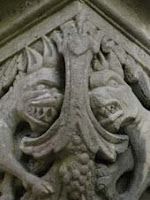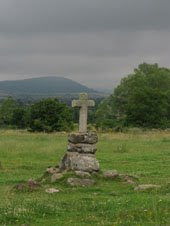 David was musing on what makes walking in France feel so different to walking in England. Was it the signage? We've become so used to looking for the red-and-white painted flashes on all sorts of walls, posts, pipes and old farm implements. Was it the role of the English pub in the countryside? Was it that in France we can walk down roads for hours and see no cars?
David was musing on what makes walking in France feel so different to walking in England. Was it the signage? We've become so used to looking for the red-and-white painted flashes on all sorts of walls, posts, pipes and old farm implements. Was it the role of the English pub in the countryside? Was it that in France we can walk down roads for hours and see no cars?
No, he concluded. It's the dogs. We're English; of course we like dogs. Any straw poll would suggest that English people own far more dogs than the French. But if that's the case, where are they?
French dogs are in their gardens. You know that because they start barking as soon as they hear the tap of our sticks in the distance, and by the time we're level with their little empire, they have flung themselves against the fencing in a rage of noise. Some days it is an almost constant sound track as they pass the message from dog to dog, guardian to guardian along the road.
But why is it so different in England? We realised it has to do with the architecture here; and perhaps a little paranoia. In England you have a front garden and a back garden. The front is where strangers can come, or friends. The postman, the milk man and assorted leaflet delivery people can come right up to your door and transact their business. The dog belongs in the back, out of sight. In France, houses sit in the centre of a pool of land through which the dogs roam freely. The dogs know that everything within the perimeter fence is theirs. No longer can neighbours just pop in at will: they have to call and be let in. And the letter box is safely constructed outside the fence, to reduce the number of law suits brought by postal workers. Thus, to the dog, anything approaching their domain is an unauthorised intruder.
Having kept visitors firmly outside the home enclosure perhaps it's not surprising that the dogs adopt with such vigour the mantle of suspicion. But what came first - the owners' fear of the stranger or their alienating of all outsiders by their argumentative dogs?
Everywhere we see signs boasting of the dogs in simpering, infantile terms: "Je veille pour mon maitre", "Je monte la garde", "Attention au chien méchant", often with a sketched picture of a certain ferocious breed. Only twice have we seen a gentle mocking of the French obsession with their guard dogs. In Honfleur a house claimed possession of "Un chat très méchant et peu nourri"; and later, disarmingly, a cottage owned up to "Un chien pas du tout méchant".
"French men love their dogs more than they love their families," we were told (by a cat owner). Certainly, even in the lost ends of towns where everything is closed there will be a dog-grooming parlour open for business. "What about the English?"
"The English live with dogs," we decided, "not as little princes - but just another member of the family."
28 February 2008
Thursday, 13 March 2008
Dog tired
Posted by
Rachel Escott
at
12:33
![]()





































































No comments:
Post a Comment